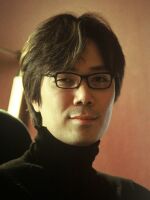Kim Young-ha
| Kim Young-ha | |
|---|---|
 |
|
| Born |
November 11, 1968 Hwacheon, South Korea |
| Occupation | Novelist |
| Alma mater | Yonsei University |
| Genre | Fiction |
| Notable works | I Have the Right to Destroy Myself |
| Notable awards | Yi Sang Literary Award, Dong-in Literary Award |
| Website | |
| kimyoungha |
|
| Kim Young-ha | |
| Hangul | 김영하 |
|---|---|
| Hanja | |
| Revised Romanization | Gim Yeong-ha |
| McCune–Reischauer | Kim Yŏngha |
Kim Young-ha is a modern South Korean writer.
Kim was born in Hwacheon on November 11, 1968. He moved from place to place as a child, since his father was in the military. As a child, he suffered from gas poisoning from coal gas and lost memory before ten. He was educated at Yonsei University in Seoul, earning undergraduate as well as graduate degrees in Business Administration from Yonsei University, but he didn't show much interest in it. Instead he focused on writing stories. Kim, after graduating from Yonsei University in 1993, began his military service as an assistant detective at the military police 51st Infantry Division near Suwon. His career as a professional writer started in 1995 right after discharge when his short-story A Meditation On Mirror (Geoure daehan myeongsang) appeared in Review, and the following year, won the 1st New Writer’s Award given by Munhak Dongne with the novel, I Have a Right to Destroy Myself (Naneun nareul pagoehal gwolliga itda).
Kim previously worked as a professor in the Drama School at Korean National University of Arts and on a regular basis hosted a book-themed radio program. In autumn 2008, he resigned all his jobs to devote himself exclusively to writing. Kim also translates English novels, most recently a Korean adaptation of F. Scott Fitzgerald's The Great Gatsby. He was a visiting scholar at Columbia University from September 2010 to June 2011.
His first novel, published in Korean in 1996, was I Have the Right to Destroy Myself. It has been translated into English, French, German, Czech, Dutch, Polish, Turkish, Chinese, and Vietnamese. Kim’s novels and stories focus on articulating a new mode of sensitivity to life’s thrills and horrors as experienced by Koreans in the ever-changing context of a modern, globalized culture. In his search for a literary style, as is often the case with internationally renowned post-modern novelists, Kim attempts to embark on exhilarating and provoking crossing of the boundaries of high and low genres of narratives. His historical novel Black Flower, which won the Dong-in Literary Award in 2004, tells the story of Korean migrant workers in Mexico later involved in a Pancho Villa-led military uprising. Sources of inspiration for this novel came from classical Bildungsroman, stories of sea trips as illustrated by the popular film Titanic, ethnography of religion, as well as Korean histories of exile and immigration. Another instance of Kim’s mixed style is found in Your Republic Is Calling You, his fourth novel, in which he raises the question of human identity in a democratic and consumerist Korean society by presenting a North Korean spy and his family in Seoul in the manner of a crime fiction combined with a truncated family saga and naturalist depiction of everyday life. It has been translated seven languages including English (US title: Your Republic Is Calling You).
...
Wikipedia
